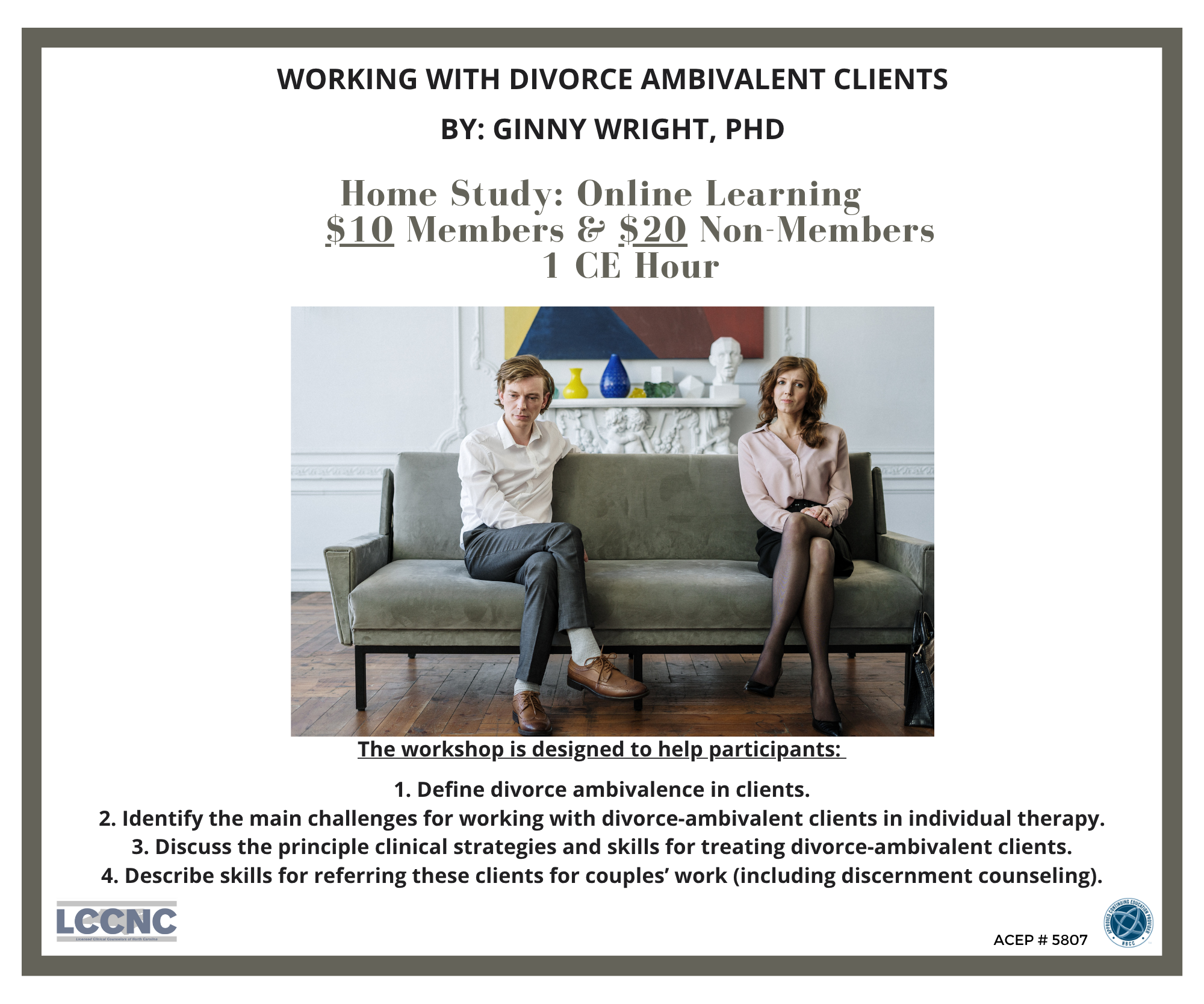Self-Paced
Research supports the long-held observation that thoughts of ending a marriage are common, and that people often remain ambivalent about divorce well into the legal process of martial dissolution. Divorce ambivalence is a frequent topic in therapy, even when it is not among presenting problems, yet graduate training programs do not necessarily provide training on how to intervene with clients struggling with divorce ambivalence. In fact, recent research suggests that individual (and couples) therapists may often resort to relationship-undermining statements when clients discuss problems in their marriage.
An important step for psychologists and other mental health professionals is to understand the unique interaction patterns common to couples in crisis and some of the common clinical challenges to expect. Likewise, we know that many of these couples come with a “mixed agenda” such that only one partner is strongly favoring divorce. In these situations, it is important to recognize and respond to the unique needs of the spouse who is leaning out of the marriage. Therapeutic response may be different in those situations where the dissatisfied spouse is describing “hard reasons” for wanting a divorce (e.g., abuse, addictions, affairs) versus “soft reasons” (all others, including poor communication, feeling distant, etc.)
A common therapeutic mistake in mixed agenda couples who are on the brink of divorce is to initiate couples therapy when one spouse is not committed to trying to fix the marriage. Discernment Counseling is an increasingly accepted alternative for these couples. The short-term, highly focused intervention seeks to help couples gain clarity and confidence in their decision making about the path for their marriage.
This educational workshop provides valuable strategies for identifying divorce ambivalence and for addressing the challenges therapists face when indecision about marriage presents in therapy. Participants learn methods of assessing and treating clients who are divorce-ambivalent and "leaning out" of their marriage versus those who are "leaning into" their marriage. Finally, the workshop introduces discernment counseling as a promising process for couples experiencing divorce ambivalence and provides guidance for recognizing individuals and couples who would benefit from discernment counseling.

1. Define divorce ambivalence in clients.
2. Identify the main challenges for working with divorce-ambivalent clients in individual therapy.
3. Discuss the principle clinical strategies and skills for treating divorce-ambivalent clients.
4. Describe skills for referring these clients for couples’ work (including discernment counseling).
PRESENTER:
Dr. Ginny Wright is a licensed clinical psychologist, Discernment Counseling Master Practitioner, and an official speaker for the Doherty Relationship Institute.
After graduating from Duke University in 1986, and before starting her graduate studies, she spent a year working at a runaway shelter outside of Washington, D.C. She then earned her doctoral degree from the Child & Family Clinical Psychology program at Michigan State University and completed her internship at Children’s Memorial (now Lurie Children’s) Hospital in Chicago. Prior work positions include staff psychologist at Children’s Hospital of Wisconsin and staff psychologist at the Child Protection Center in Milwaukee, Wisconsin.
Dr. Wright co-founded Drs. Lapporte, Wright & Assoc., PC in 1994. She sees clients of all ages and works with individuals, couples and families. Specializations include: discernment counseling, child and adolescent psychology, family systems therapy, couples therapy, medical psychology and performance psychology.
In addition to direct client care, Dr. Wright offers workshops on a variety of marriage- and divorce-related topics and is an invited contributor for a number of media outlets (print and podcast). She also provides clinical consultation services to other mental health providers, especially those who offer discernment counseling.
PROVIDER INFORMATION:LCCNC
605 N. Terrace Place
Morganton, NC 28655
(919) 714-9025
info@lccnc.org
www.lccnc.org
